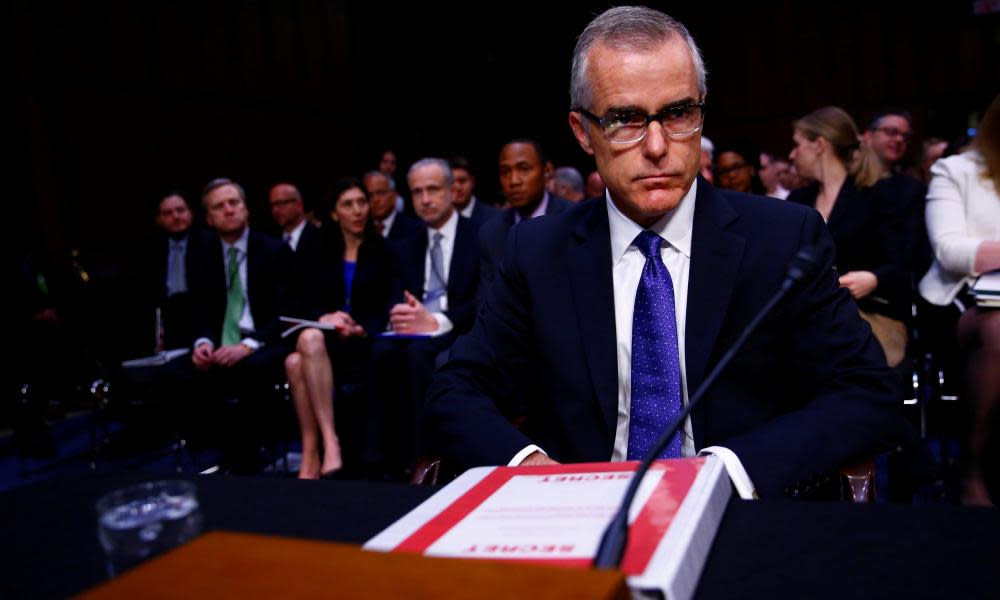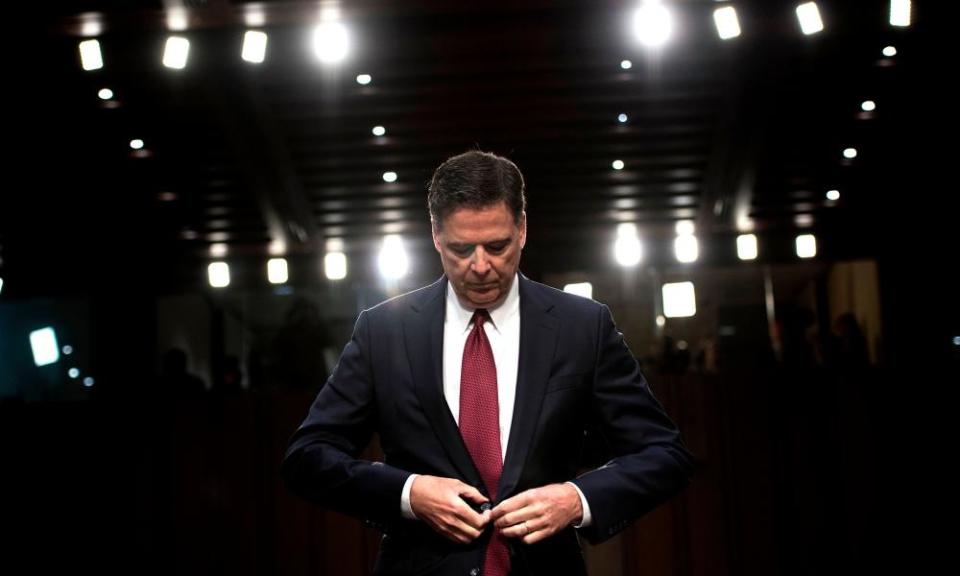The Threat review: Andrew McCabe FBI memoir aims at 'mob boss' Trump

Criminal investigations of Trump World and the 2016 presidential campaign continue unabated. Federal prosecutors in Manhattan have placed the president’s inaugural committee and the Trump Organization in their crosshairs. News is rife with talk of subpoenas and the Racketeer Influenced and Corrupt Organizations Act – or Rico.
Next month, Paul Manafort, Trump’s one-time campaign manager, is scheduled to be sentenced and Michael Cohen, Trump’s former foul-mouthed fixer, will begin a three-year prison term. So this is what “modern presidential” looks like: Donald J Trump meets Goodfellas.
The Threat, Andrew McCabe’s memoir, is subtitled How the FBI Protects America in the Age of Terror and Trump. As he writes, “The FBI has always been the nemesis of criminals. Today the FBI is under attack by the president of the United States.”
McCabe’s disdain is born in part of a real-life grudge. A career FBI agent, a lifelong Republican married to a Democrat, he oversaw the FBI inquiries into Hillary Clinton’s emails and Russian election interference. Frequently targeted by Trump for his wife’s failed bid for a seat in the Virginia legislature, in March 2018 McCabe was fired, less than two days before he was slated to retire, by Jeff Sessions, then attorney general, on a recommendation from the FBI Office of Professional Responsibility (OPR).
The Threat is not just another exercise in score-settling, although there is plenty of that
According to Sessions, McCabe “made an unauthorized disclosure to the news media and lacked candor” during an OPR review of the FBI and justice department’s handling of an investigation into the Clinton Foundation, a charge repeatedly denied by McCabe. The FBI director, Christopher Wray, stated that the firing was not political but was done “by the book”. Suffice to say, many remain unconvinced.
These days, Sessions too is out of a job but it is McCabe who has a book. It is definitely worth the read. The Threat is not just another exercise in score-settling, although there is plenty of that.
McCabe paints a portrait of Trump as a mob boss, an observation in sync with Bloomberg’s Josh Green in The Devil’s Bargain and James Comey, the fired FBI director, in A Higher Loyalty. McCabe, however, goes further.
Everyone catches it, not only Trump and his minions. The Threat contrasts the independence of the FBI and justice department under Trump and Barack Obama, with McCabe saying “Obama probably came closest to [the] ideal. The current administration is … like nothing we’ve ever seen before.”
Pulling no punches, he takes to task Loretta Lynch, Obama’s second attorney general, for her refusal to recuse from the Clinton email investigation while attempting to maintain a show of being above it all. As McCabe sees it, Lynch and Sally Yates, then deputy attorney general, wrongly viewed “the investigation of Hillary Clinton … likely nominee of the Democratic party, who was being supported by the president of the United States, to whom they owed their jobs … as a case they could handle without prejudice”.
According to McCabe, Lynch and Yates “made a feckless compromise”. Specifically, “they designated career professionals in the National Security Division as decision-makers in this case but didn’t unambiguously commit to abide by those people’s decisions”. It was, he writes, “the worst possible choice afforded by the situation”.
It didn’t end there. There is Lynch’s meeting with Bill Clinton at the Phoenix airport and again McCabe does not mince words: “The tarmac meeting was a horrible lapse in judgment by Loretta Lynch. She should have recused herself … she did not – she made things worse.”
With the advantage of hindsight, McCabe is critical of the decision taken by Comey, his boss at the time, to publicly announce the FBI’s recommendation that no charges should be pursued against Hillary Clinton. In “retrospect”, as McCabe frames it, “perhaps I would have said to Comey, ‘Don’t do it. Let’s be the normal Bob Mueller, say-nothing FBI of old.’”
Instead, Mueller is special counsel, Trump roams the White House and America is treated to a nonstop crime drama. Yet, somehow, we are not entertained.

As reported by the Guardian, McCabe breaks new ground by writing that the president “ordered” Rod Rosenstein, the deputy attorney general, “to write the memo justifying” the firing of Comey. Unmentioned is the spate of denials that emanated from the White House at the time concerning Trump’s involvement.
Sean Spicer and Sarah Sanders, presidential spokespeople, publicly absolved their boss. As Sanders put it, Trump “did not direct” Rosenstein “to write the context of the memo, he asked him to make the comments that he already made into writing”.
While McCabe’s version of events may be questioned – Rosenstein has not challenged it – it is also worth remembering ex-White House staffer Cliff Sims’s take on Sanders, namely she “didn’t press as hard as she could have for the rock-bottom truth”. As for Spicer, his post-inaugural exercise in fan fiction earned him acid-dripping mockery on SNL.
McCabe fails to clear up the mystery surrounding reports attributed to his memos that in May 2017, in the aftermath of Trump firing Comey, Rosenstein weighed secretly recording the president and raised the possibility of invoking the 25th amendment in order to remove him. Likewise, McCabe does not address reports that he and Rosenstein each urged the other to step down in the aftermath of Rosenstein appointing Mueller as special counsel.
Instead, McCabe takes a shot at Rosenstein for his wish for advice on the appointment of a special counsel. In McCabe’s telling, Rosenstein said: “The one person I would like to talk about this situation is Jim Comey.” McCabe returned to his office, he writes, in a state approximating “shock”.
The Threat should leave the reader worried that our cold civil war is taking its toll on the US and its institutions. As Republicans regularly bash law enforcement, Democrats embrace the intelligence community. We are staring at a world turned upside down.

